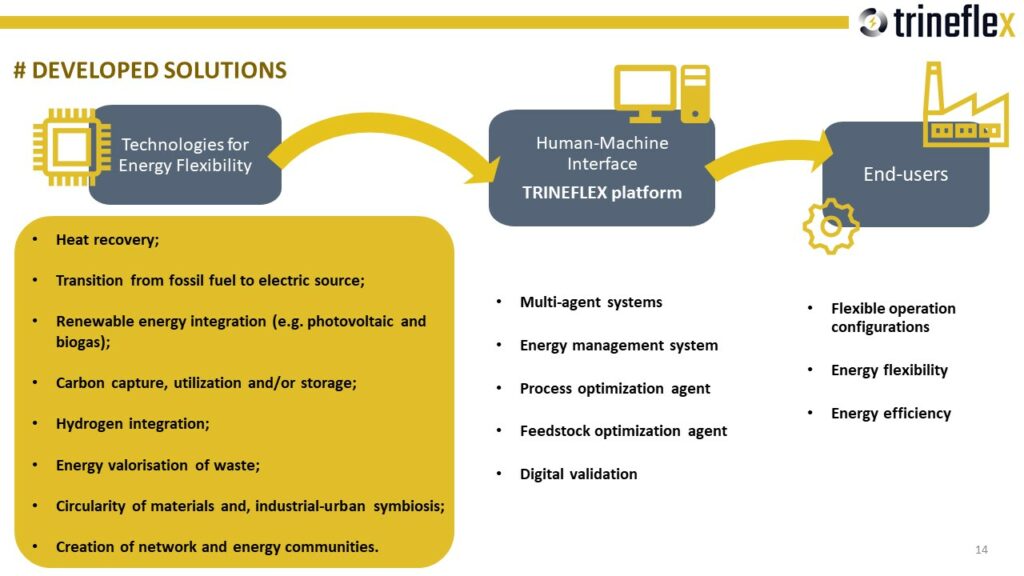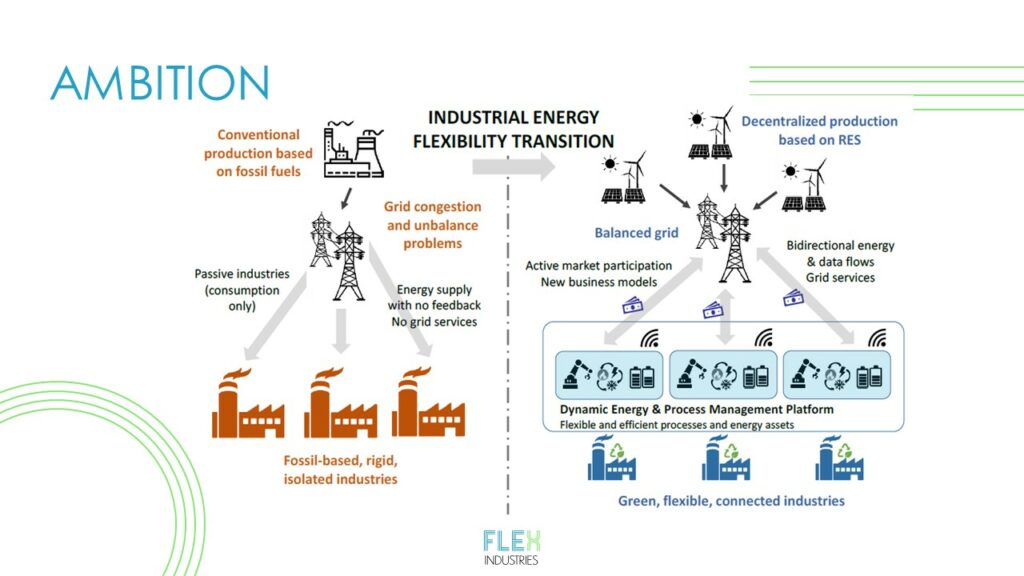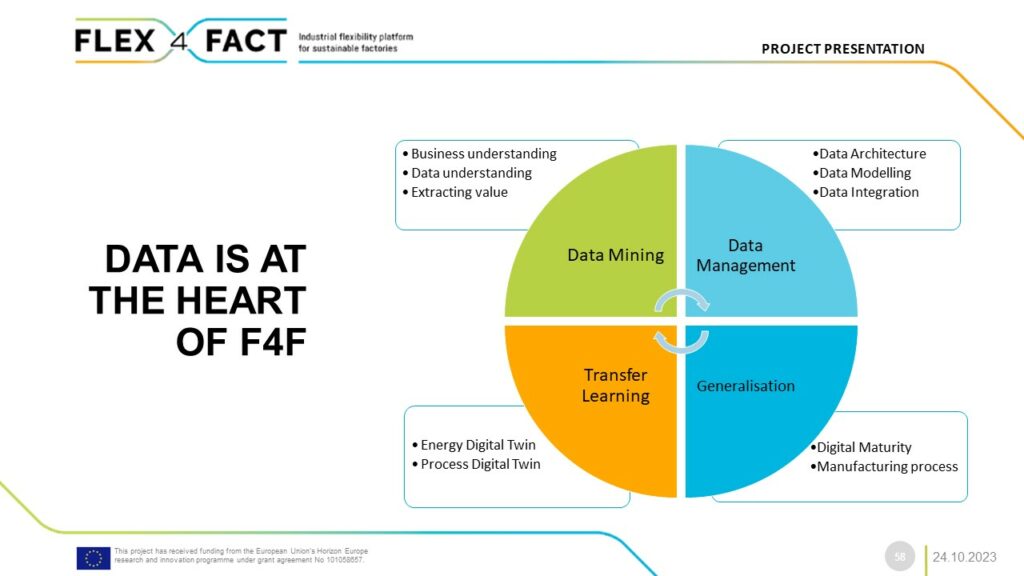On October 23, 2023, the three EU-projects – FLEX4FACT, TRINEFLEX, and FLEXIndustries – funded under the same topic, hosted a joint webinar focusing on energy flexibility in the industrial sector. This webinar provided a platform for presenting innovative approaches and solutions aimed at enhancing the efficiency and sustainability of industrial processes.

The webinar commenced with an introduction by Hanne Sæle, a senior advisor at Statnett, the operator of the Norwegian transmission power grid. She emphasized the growing necessity for a versatile power system capable of accommodating an increasing demand of flexibility. Importantly, she highlighted the shift from today’s power system, where generation remains mainly centralised and follows consumption, to the future system, where utilisation of resources such as variable renewable generation must be improved through flexibility. This growing need for flexibility offers new business opportunities: service providers such as aggregators will – based on innovative digital solutions – provide flexibility to grid operators who will benefit from better grid operation and planning. Furthermore, more and more industrial stakeholders will act as flexibility providers and be rewarded for their participation in the flexibility market.
TRINEFLEX – Transformation of energy intensive process industries through integration of energy, process, and feedstock flexibility
The next point on the agenda was the presentation of the TRINEFLEX project, by project coordinator Filipa Lima from AIMEN in Spain. The project is dedicated to the transformation of energy-intensive process industries through several complementary measures. This includes the implementation of energy efficiency measures and a flexible operation management at plant level as well as the integration of technologies allowing for more energy flexibility such as the electrification of industrial processes, the recovery of heat as well as the integration of renewable sources and hydrogen solutions.
To demonstrate the solutions developed within the project, the Verallia use case was showcased by Matteo Marini. The Verallia Group is a global leader in the glass packaging sector. The company’s mission – to “Re-Imagine Glass for a Sustainable Future” – is underlined by their aim to reduce CO2 emissions by 46% by 2030 compared to the 2019 level. Within TRINEFLEX, 2 main industrial processes will be optimised: the feeders used to convey glass from the furnace to the glass forming machines, and the shrink-wrapping equipment responsible for the automatic packaging of the pallets on which the bottles are stored for transport. These two pilots should lead to a reduction in energy consumption and associated CO2 emissions, as well as a more flexible industrial process management.

FLEXIndustries – Digitally-enabled FLEXible Industries for reliable energy grids under high penetration of Variable Renewable Energy Sources

The next project in the spotlight was FLEXIndustries, which aims to develop a flexibility assessment method specifically for industrial environments and bridge the gap between information and operational technology in the energy sector through digitalisation. The project was presented by the project coordinator Bruno Sodiro from RINA consulting. One of the main objectives of the project is to deliver a secure, dynamic energy and process management platform supporting improved energy management, renewable energy integration and flexibility provision in industries. Demonstrating and validating these solutions in seven real industrial environments is a central part of the project mission.
Ford Otosan, a Turkey-based automotive manufacturer, is one of FLEXIndustries’ demosites. Mehmet Alper Sahin presented the main challenges faced by the company’s plants, including high electricity and natural gas consumption, limited installed renewable energy capacity, a lack of real-time energy monitoring and the need for data-driven energy optimisation models. Within FLEXIndustries, the demo case focuses on the paint shop. Several measures are implemented to reduce electricity and natural gas consumption by 4% and increase renewable energy generation by 7%. The control and management is improved thanks to new sensors and the implementation of the platform, a new 3.68 MW PV system is built, new solar walls will be installed on buildings such as the paint shop, and the heat process of the paint shop will be optimised.
FLEX4FACT – Industrial Cluster FLEXibility platform for sustainable FACTories to reduce CO2 emissions and to enable the Energy Transition
Ragnhild Eleftheriadis and Chiara Caccamo from SINTEF presented the FLEX4FACT project, which is dedicated to developing cost-efficient solutions and tools to enhance production process flexibility, harness excess energy streams, and offer demand response services to external agents. One of the project activities is to create digital twins of industrial processes to achieve greater energy flexibility during operation. Data and data processing plays a pivotal role in FLEX4FACT, encompassing data mining, management, transfer learning, and generalization. It is needed to run digital twins, and the algorithms of the FLEX4FACT platform which allows to optimise manufacturing processes and provide flexibility to power grid operators. The ambition of the project is to develop standardised and open source data models that can be scaled-up and reused by other industries.

The FLEX4FACT use case was presented by Marco Barbagelata from STAM, the technical leader of the SEACSUB use case. SEACSUB is an Italian company that manufactures diving equipment and wants to relocate its production from Asia to Europe. The objectives of this use case included reducing energy consumption by identifying bottlenecks in the plant’s energy system, increasing self-consumption through a newly installed PV system and taking advantage of energy flexibility thanks to solutions developed in FLEX4FACT. The activities in this use case range from improving monitoring and planning with new sensors to integrating a new PV system and developing a digital twin for the moulding machines. The first results are already visible: SEACSUB’s energy monitoring capabilities were significantly improved by the new sensor infrastructure, which also contributed to a better allocation of orders and their relationships to materials and machines.
Three complementary projects striving to learn from each other
Throughout the webinar, several common themes and shared objectives emerged among the three projects. Each project seeks to unlock the potential of energy flexibility in the industrial sector, thereby enhancing energy efficiency, reducing carbon emissions, and creating more sustainable processes. This first event allowed to identify topics such as data management and renewable source integration that can be further deepened in cross-project workshops. The partners of TRINEFLEX, FLEXIndustries and FLEX4FACT are committed to exploiting synergies between the three projects and looking forward to future knowledge exchange opportunities.
The recording of the webinar is available on the Youtube channel of the FLEX4FACT project here: Unlocking Energy Flexibility for Sustainable Industrial Processes – YouTube.
We would like to thank all speakers for their participation, as well as Marco Barbagelata for the moderation of the webinar.
